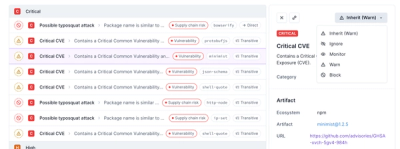
Research
Security News
Malicious npm Package Typosquats react-login-page to Deploy Keylogger
Socket researchers unpack a typosquatting package with malicious code that logs keystrokes and exfiltrates sensitive data to a remote server.
pug-lexer
Advanced tools
Package description
The pug-lexer npm package is a lexer for the Pug templating language. It tokenizes Pug source code into a stream of tokens that can be used for further processing, such as parsing or compiling into HTML.
Tokenizing Pug Source Code
This feature allows you to tokenize Pug source code. The code sample demonstrates how to use the pug-lexer to convert a simple Pug template into a stream of tokens.
const lexer = require('pug-lexer');
const tokens = lexer('p
| Hello, World!');
console.log(tokens);Handling Indentation
This feature handles the indentation in Pug templates. The code sample shows how nested elements are tokenized, preserving the hierarchical structure.
const lexer = require('pug-lexer');
const tokens = lexer('div
p Hello
span World');
console.log(tokens);Custom Filters
This feature supports custom filters in Pug templates. The code sample demonstrates how a custom filter like 'markdown' is tokenized.
const lexer = require('pug-lexer');
const tokens = lexer('p: markdown
**Hello, World!**');
console.log(tokens);The pug-parser package takes the tokens generated by pug-lexer and converts them into an Abstract Syntax Tree (AST). While pug-lexer focuses on tokenizing the source code, pug-parser is responsible for the next step in the compilation process.
The pug package is a high-level package that includes both the lexer and parser, along with other components, to compile Pug templates into HTML. It provides a more comprehensive solution compared to pug-lexer, which is focused solely on tokenization.
The htmlparser2 package is a fast and forgiving HTML/XML parser. While it is not specific to Pug, it provides similar functionality in terms of tokenizing and parsing HTML/XML content. It is more general-purpose compared to pug-lexer, which is specialized for Pug.
Readme
The pug lexer. This module is responsible for taking a string and converting it into an array of tokens.
npm install pug-lexer
var lex = require('pug-lexer');
lex(str, options)Convert Pug string to an array of tokens.
options can contain the following properties:
filename (string): The name of the Pug file; it is used in error handling if provided.plugins (array): An array of plugins, in the order they should be applied.console.log(JSON.stringify(lex('div(data-foo="bar")', {filename: 'my-file.pug'}), null, ' '))
[
{
"type": "tag",
"line": 1,
"val": "div",
"selfClosing": false
},
{
"type": "attrs",
"line": 1,
"attrs": [
{
"name": "data-foo",
"val": "\"bar\"",
"escaped": true
}
]
},
{
"type": "eos",
"line": 1
}
]
new lex.Lexer(str, options)Constructor for a Lexer class. This is not meant to be used directly unless you know what you are doing.
options may contain the following properties:
filename (string): The name of the Pug file; it is used in error handling if provided.interpolated (boolean): if the Lexer is created as a child lexer for inline tag interpolation (e.g. #[p Hello]). Defaults to false.startingLine (integer): the real line number of the first line in the input. It is also used for inline tag interpolation. Defaults to 1.plugins (array): An array of plugins, in the order they should be applied.MIT
FAQs
Unknown package
The npm package pug-lexer receives a total of 897,075 weekly downloads. As such, pug-lexer popularity was classified as popular.
We found that pug-lexer demonstrated a not healthy version release cadence and project activity because the last version was released a year ago. It has 2 open source maintainers collaborating on the project.
Did you know?

Socket for GitHub automatically highlights issues in each pull request and monitors the health of all your open source dependencies. Discover the contents of your packages and block harmful activity before you install or update your dependencies.

Research
Security News
Socket researchers unpack a typosquatting package with malicious code that logs keystrokes and exfiltrates sensitive data to a remote server.

Security News
The JavaScript community has launched the e18e initiative to improve ecosystem performance by cleaning up dependency trees, speeding up critical parts of the ecosystem, and documenting lighter alternatives to established tools.

Product
Socket now supports four distinct alert actions instead of the previous two, and alert triaging allows users to override the actions taken for all individual alerts.